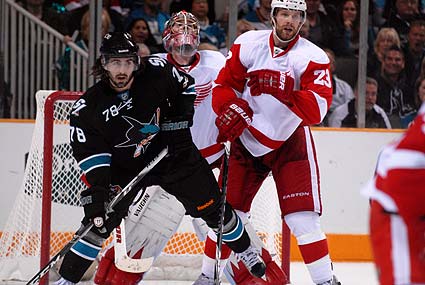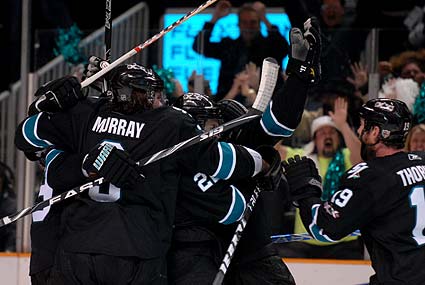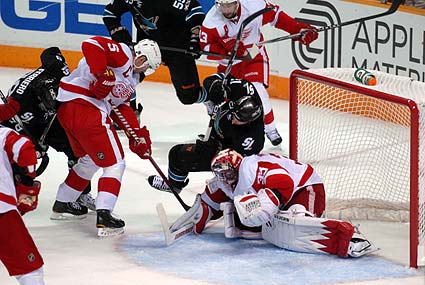WCSF Game 1: San Jose Sharks earn come from behind 2-1 OT win against Detroit, Benn Ferriero steps into lineup and scores game winning goal on 24th birthday

#78 BENN FERRIERO BATTLES #23 BRAD STUART SHORTLY BEFORE OT GOAL

#78 FERRIERO IS MOBBED BY TEAMMATES AFTER OVERTIME GW GOAL IN GAME 1

#21 SCOTT NICHOL IS CHECKED ON TOP OF #35 JIMMY HOWARD IN 2ND
The San Jose Sharks sent a message with a come-from-behind 2-1 OT win over the Detroit Red Wings Friday night at HP Pavilion. A confident team where players are battling for each other, when on their game there are few obstacles they can not overcome. In game 1 of the 2011 Western Conference Semifinals, that obstacle was Detroit. On his 24th birthday checking winger Benn Ferriero was inserted into the playoff lineup for the first time. He delivered his own present. Shortly after a 4-minute overtime power play expired without conversion, Ferriero jumped on a loose puck in the offensive zone and fired a shot off traffic for the overtime game winner.
“For it to be his birthday and his first game in the postseason, what a birthday gift he gave us,” San Jose Sharks captain Joe Thornton said after the game. “We have to give him a birthday present, because that was a birthday present for us.”
With the game tied 1-1, Ferriero was reunited with Worcester Sharks linemate Logan Couture for a shift in overtime. Couture used body position to protect the puck in the corner, preventing left wing Justin Abdelkader from clearing the puck and allowing Detroit to reset at even strength after a successful 4-minute penalty kill. Abdelkader pinned Couture along the boards, but Ferriero gained possession with back support. “Couture poked it away a little bit, I was able to swing in there and grab it,” Ferriero said. “We tried to throw pucks to his feet all game long, get rebounds and stuff like that. Sprinted out of the corner, threw it to the net, and it hit a stick or a skate, I couldn’t really tell. It took a good bounce and ended up in the back of the net.” It was Ferriero’s first career NHL playoff game and his first career NHL playoff goal.
Was that the biggest goal he has scored in his career? “Yeah, I would say so,” Ferriero told reporters after the game. Asked about his second biggest goal, he noted a triple overtime game winner against UNH, “but that doesn’t compare to this one,” Ferriero said. The Massachusetts high school and Boston College product was drafted by the Phoenix Coyotes in the 7th round in 2006, but he was not signed after he finished his collegiate career. With deeps roots in the Northeastern hockey community, the Sharks scouting staff picked him up as a free agent in 2009. Ferriero made an impression for his intelligent two-way play during a number of NHL callups over the next two seasons. He played in 22 games for San Jose registering 5 points, and 33 games this season registering 5 goals and 9 points.
Ferriero’s insertion into the lineup was unexpected, his performance in OT was not. The Sharks development system takes players with strong offensive instincts, and churns out intelligent, defensively responsible 2-way players that can fill in when needed. Veteran or rookie, sometimes playoff emotions can lead to a player trying to do too much, as may have been the case with Jamie McGinn in game 6 of the WCQF. McGinn took a 5-minute major late in the game, and he was replaced in the lineup by Ferriero. While Detroit’s third and fourth line depth has been highly touted, the Sharks system has 4-5 young developing forwards that can come in and perform including Ferriero, Jamie McGinn, John McCarthy and Andrew Desjardins. A Tommy Wingels and Cam MacIntyre may be a little futhur along in the SJ development process, but both may be expected to make more of an impact down the line. While Detroit registered 10 different goal scorers in only 4 first round games, the fact that San Jose has a number of young players battling veterans Jamal Mayers and Ben Eager for an opportunity to play is a sign of San Jose’s depth.
The Sharks and Red Wings play a similar net front, grinding, shots on goal system, but the execution of that system in game 1 gave a clear advantage to San Jose. Detroit regained the services of Henrik Zetterberg (46 playoff goals, 7 game winning playoff goals) and Johan Franzen (37 playoff goals, 11 game winning playoff goals) after knee and ankle injuries limited their play against Phoenix. Both made an impact in the first period. Daniel Cleary, Franzen, Tomas Holmstrom all waged massive battles in front of San Jose Sharks goaltender Antti Niemi. Cleary and Holmstrom were particularly effective, with Dan Boyle and Marc-Edouard Vlasic being the defenseman tasked with wedging them from out in front of the crease. 6-foot-3, 225-pound Todd Bertuzzi played a little off the net, and on the bench head coach Mike Babcock could be seen over his shoulder after a couple of his shifts. Getting to the front of the net had to be a priority for #44.
The opening goal of the game came on a clean offensive zone faceoff win by Pavel Datsyuk against Scott Nichol. Datsyuk held on to the puck enough to give Zetterberg lead time down low, then he dumped it down in the corner. After a pair of Sharks overloaded on Zetterberg, Datsyuk picked up the loose puck and reversed up the wall. He lifted a saucer pass between the sticks of Nichol and Thornton, and hit a charging Nicklas Lidstrom in stride. Lidstrom wristed a quick shot that snuck just outside the glove of Niemi. The Datsyuk-Lidstrom combination may be one of the best in the history of the NHL, but unlike the highlight reel dekes it is the attention to detail on smaller routine plays that make them stand out among a league full of star players.
As the Sharks did against Los Angeles on several occasions, there was a switched flipped internally, and they dominated long stretches of the second period. “We had 3 minutes at the start of the second, and 3 minutes at the end, other than that they dominated the whole period,” Detroit Red Wings head coach Mike Babcock said in a press conference. The second period adjustment San Jose Sharks head coach Todd McLellan made had to be to get traffic in front of the net. If and when a goaltender stands on his head and makes 40-50 saves, which happens often against San Jose, then players may be directed to get in their head a little more, spray them with ice, make contact.
There are numerous complaints about a first round exit against Anaheim two years ago, the main culprit was allowing a technical Jonas Hiller to play his game without much of a disturbance. Devin Setoguchi only has 1 goal so far in the playoff (an OT GW vs LA in game 3), “ice cold” according to one national commentator, but Setoguchi alone has made more contact with goalies to date in this postseason than in the 2006 amd 2007 playoff runs combined. A partial list of the traffic in front of Jimmy Howard in the second period: Setoguchi, Setoguchi (tipped shot), Couture (tipped shot), Setoguchi (tipped shot), Thornton (tipped shot), Heatley, Mitchell (tipped shot) and Scott Nichol. The Sharks outshot Detroit 18-9 in the period, although a number of shots deflected off traffic, but were still unable to break through on the scoreboard.
A struggling post-season Sharks power play (2-for-23, 8.7%) met a struggling post-season Detroit penalty kill (12-for-18, 66.7%) in the third period. It was a controversial penalty as Bertuzzi was called for a hit on Pavelski, while two very heavy checks by Ryane Clowe were not. Howard, who had made highlight reel saves on Torrey Mitchell and Joe Pavelski in the second period, stopped a big point shot by Joe Thornton. The puck deflected into the air, and was batted home by Joe Pavelski to tie the game.
The turning point may have come before and after Justin Abdelkader took a 4-minute high sticking double minor against Niclas Wallin in overtime. The Sharks dodged a bullet on either side of the penalty. “Abdelkader comes down in overtime and has a 2-on-1, a great scoring opportunity. We get a blocked shot on a penaly off of it,” Todd McLellan said. The Sharks tried to bear down with the 4-minute advantage, but the Red Wings outworked them. An aggressive Detroit penalty kill, which cleared out in front of the net and challenged shooters a lot more than the Los Angeles penalty kill, made several clears and got bodies in front of Ryane Clowe and Dany Heatley early. The Sharks PP eased off a little, and was not sharp in the neutral zone or on entry into the offensive zone. Setoguchi made a slick cut between two players off the wall, and fired a quick shot on goal. Demers followed on the next shift with a point shot, but Howard easily made the save. Couture won three 1-on-1 battles as the penalty expired, and the execution between forwards and D was solid resulting in several point shots on net. The power play may not have been a success on the scoresheet, but it got things together enough to dominate the offensive zone for the final 20 seconds and set the table for the game winner.
Right now in the Stanley Cup Playoffs there is an intense focus on officiating. In the first round, the Sharks vs Kings series was sandwiched by controversial calls and non-calls. A non-call on a Jarret Stoll forearm to the head of Ian White, a subsequent 1- game suspension by the league, and Kings head coach Terry Murray’s pointed criticism of Jason Demers and Dany Heatley all raised the temperature of that series. It nearly boiled over when Wayne Simmonds lifted the stick of Joe Thornton, and Thornton was called for a 4-minute double minor in the eliination game 6. Later in the game, officials called a 5-minute major on Jason Demers. With the exception of two 10 minute majors in game 4, the Kings received the penalty advantage in every game of the series but one. Two blemishs for the Red Wings in their first round sweep of Phoenix were undisciplined penalties, and a struggling 12-for-16 (66.7%, 16th) penalty kill.
For the Sharks-Detroit second round series, the league assigned two of its most veteran officials for game 1 of the WCSF. Former Director of Officiating Stephen Walkom stepped down from his position to return to NHL ice in 2009. Walkom has officiated the Stanley Cup Finals, Olympics, the World Cup, and is one of the most respected referees in the sport. His partner on Friday night was Steve Kozari, head instructor of the Kozari Officiating School and a veteran official of hundreds of WHL, AHL and NHL games. Even given the experience, a matching minor call on Joe Pavelski and goaltender Jimmy Howard received a vocal rebuke from the boisterous sellout crowd inside HP Pavilion. After a replay showed Pavelski being checked into the goalie from behind, the crowd erupted with several thousand looking at the officials and pointing at the giant videoboard. Detroit fans, legendary for their at times onerous interpretations, objected to a late boarding call on Todd Bertuzzi when two similar hits by Ryane Clowe were not called. Joe Pavelski scored the game tying goal on a subsequent power play. Any overtime penalty in the playoffs is critical, but a 4 or 5 minute penalty is the nuclear option for an NHL official. Monday night in Los Angeles that happened against San Jose, Friday night in Northern California it was Detroit’s turn. Kozari called a 4-minute minor on Justin Abdelkader 2:43 into OT after he got a stick up on defenseman Niclas Wallin. The cut, “it’s somewhere in my beard,” Wallin said after the game, drew blood. Kozari went by the book and made the decision. The Wings killed off the 4-minute double minor, but could not reset at even strength before Benn Ferriero picked up a loose puck and fired a shot off traffic for the game winner. Morale of the story: even with the best officiating in the league, officials will get booed. It is as it always will be.
The CBC’s Jeff Marek posted a list of NHL officials that will be working the second round of the Stanley Cup Playoffs. Not on the list, Steve Miller, an 11-year linseman who worked the final game of the Stanley Cup Finals last year. After an EPSN investigation into Patrick Kane’s missing 2010 Stanley Cup winning puck, Miller was pulled when video clips apparently surfaced that may have shown him picking up an object up after the game. The league has called the matter closed, but an NHL official confirmed to ESPN that Miller was temporarily on hold from working the playoffs. “There are lots of questions out there and to have any potential distraction while our playoffs are going on is not fair,” NHL SVP of public relations Gary Meagher told ESPN Friday. The league can ill afford to have any quality officials out of the rotation, and Saturday on Hockey Night in Canada Pierre LeBrun noted that Miller will return for 2 games in Tampa Bay.. According to ESPN’s Wayne Drehs, the NHL drops from 20 (out of 34 total) linesman in the first round to 12 in the second round, then 8 in the Conference Final and 4 for the Stanley Cup Finals. Friday night in San Jose, Jay Sharrers and Brad Lazarowich were the linesman supporting referees Steve Kozari and Stephen Walkim. Brian Pochmara was the standby official.
Game Notes:
Game Notes: San Jose Sharks head coach Todd McLellan noted that his team will be geared up for it’s first afternoon start of the season (not including two European games in Sweden). “The good thing is that we practice at 11 or 12 every day,”McLellan said. “Our bodies and our minds are prepared to show up and think hockey, and play hockey at that time. Leadership will be important. Coaches will have to prepare the team properly. We are both going to play at noon, we have to play the game irregardless of what time it is at.” The game will be a national NBC broadcast at 12 noon.
16 different Sharks players registered a shot on goal for San Jose, only 13 for Detroit. A key element of both teams offensive philosophies is shots on goal from the defense. San Jose had 20 shots on goal by defenseman, Detroit had 8. Combined shots on goal, blocked shots, missed shot attempts: SJ 92, DET 57. The Sharks are 4-0 in playoff overtime games in 2011, 14-16 all-time in postseason OT games. Antti Niemi finished with 24 saves on 25 shots, earning his 4th win of the postseason. A strong performance against Detroit also lowered his GAA from 3.99 to 3.40, and raised his save percentage from .863 to .878. Detroit Red Wings goaltender Jimmy Howard was strong in net, stopping 44 of 46 shots against including several of the point blank variety. The Sharks power play finished 1-for-6, and penalty kill finished 2-for-2.
Of 31 players tied or above Patrick Marleau on the NHL’s career playoff game winning goal scoring list, 16 are in the Hall of Fame. Marleau (tied for 18th at 12 GWPOG with Mark Messier, Sergei Fedorov, J.R. and Luc Robitaille), is 31 years old, with 3 years left after this one on a 4-year, $27.6M contract extention signed this offseason. Marleau leads the NHL with 12 game winning playoff goals since 2000-2001. Detroit’s Johan Franzen is second with 11. Tied for 8th on the all-time list at 15 GWPOG (along with Jaromir Jagr), is 40 years old Red Wings forward Mike Modano. The greatest U.S. born player in the stateside history of the sport was a healthy scratch by Detroit head coach Mike Babcock for game 1. Derek Meech, Kris Draper and Chris Osgood were also scratched by Detroit. Jamal Mayers, Kent Huskins, Justin Braun, Jamie McGinn and Andrew Desjardins were scratched by San Jose. 11 other AHL Worcester Sharks players and goaltender Thomas Greiss have also been called up to get a taste of the playoff experience and to help with goaltending in practice.
A photo gallery from the game is available here.







 Editor: Jon Swenson
Editor: Jon Swenson Writer: Max Giese
Writer: Max Giese Writer: Darryl Hunt
Writer: Darryl Hunt